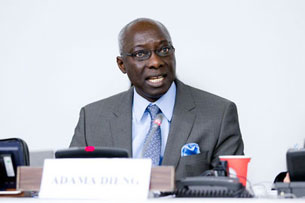The Special Adviser on the Prevention of Genocide acts as a catalyst to raise awareness of the causes and dynamics of genocide, to alert relevant actors where there is a risk of genocide, and to advocate and mobilize for appropriate action.
The Special Adviser on the Responsibility to Protect leads the conceptual, political, institutional and operational development of the Responsibility to Protect.
The mandates of the two Special Advisers are distinct but complementary. The efforts of their Office include alerting relevant actors to the risk of genocide, war crimes, ethnic cleansing and crimes against humanity, enhancing the capacity of the United Nations to prevent these crimes, including their incitement, and working with Member States, regional and sub-regional arrangements, and civil society to develop more effective means of response when they do occur.
Preventing Genocide
In 2004, following the genocidal violence in Rwanda and the Balkans, United Nations Secretary-General Kofi Annan appointed Juan Méndez as Special Adviser to fill critical gaps in the international system that allowed those tragedies to go unchecked. In 2007, Secretary-General Ban Ki-moon appointed Francis M. Deng on a full-time basis at the level of Under-Secretary-General. He also appointed Edward Luck as the Special Adviser who focuses on the responsibility to protect, on a part-time basis at the level of Assistant Secretary-General. Both Special Advisers Francis Deng and Edward Luck ended their assignments with the Office in July 2012. On 17 July 2012, Secretary-General Ban Ki-moon appointed Adama Dieng of Senegal as his Special Adviser on the Prevention of Genocide.
In a 2004 letter (S/2004/567) to the President of the Security Council, the Secretary-General listed the Special Adviser on the Prevention of Genocide’s responsibilities as follows:
- Collecting existing information, in particular from within the United Nations system, on massive and serious violations of human rights and international humanitarian law of ethnic and racial origin that, if not prevented or halted, might lead to genocide;
- Acting as a mechanism of early warning to the Secretary-General, and through him to the Security Council, by bringing to their attention situations that could potentially result in genocide;
- Making recommendations to the Security Council, through the Secretary-General, on actions to prevent or halt genocide; and
- Liaising with the United Nations system on activities for the prevention of genocide and work to enhance the United Nations’ capacity to analyze and manage information regarding genocide or related crimes.
Responsibility to Protect
At the 2005 World Summit, Heads of State and Government unanimously affirmed that “each individual State has the responsibility to protect its populations from genocide, war crimes, ethnic cleansing and crimes against humanity.” They agreed that, when appropriate, the international community should assist States in exercising that responsibility by building their protection capacities before crises and conflicts break out. However, when a state is “manifestly failing” to protect its population from the four specified crimes, the Heads of State and Government confirmed that the international community was prepared to take collective action, through the Security Council and in accordance with the Charter of the United Nations.
In his 2007 letter (S/2007/721) to the President of the Security Council, the Secretary-General recognizes the link between large scale atrocities and threats to peace and security. In this letter and in the Secretary-General’s 2010 report (A/64/864) entitled “Early warning, assessment and the responsibility to protect”, the Special Adviser on the Responsibility to Protect is charged with the development and refinement of the Responsibility to Protect concept and with continuing a political dialogue with Member States and other stakeholders on further steps toward implementation.
For reasons of efficiency, the Special Adviser on the Responsibility to Protect is also charged with working with the Special Adviser on the Prevention of Genocide to operationalize their complementary mandates within and outside of the United Nations System to have a greater impact.

